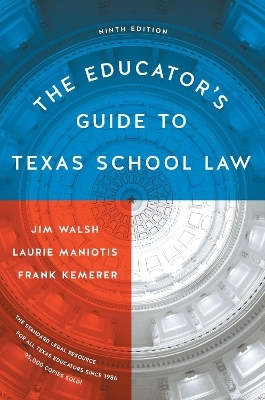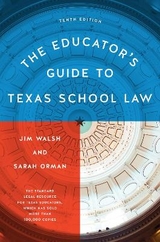
The Educator's Guide to Texas School Law
University of Texas Press (Verlag)
978-1-4773-1530-9 (ISBN)
- Titel erscheint in neuer Auflage
- Artikel merken
Much has changed in the area of school law since the first edition of The Educator’s Guide was published in 1986. This new ninth edition offers an authoritative source on all major dimensions of Texas school law through the 2017 legislative sessions. Intended for educators, school board members, interested attorneys, and taxpayers, the ninth edition explains what the law is and what the implications are for effective school operations. It is designed to help professional educators avoid expensive and time-consuming lawsuits by taking effective preventive action. It is an especially valuable resource for school law courses and staff development sessions.
The ninth edition begins with a review of the legal structure of the Texas school system, incorporating recent innovative features such as charter schools and districts of innovation. Successive chapters address attendance, the instructional program, service to students with special needs, the rights of public school employees, the role of religion, student discipline, governmental transparency, privacy, parent rights, and the parameters of legal liability for schools and school personnel. The book includes discussion of major federal legislation, such as the Individuals with Disabilities Education Act, the Family Educational Rights and Privacy Act, Section 504 of the Rehabilitation Act of 1973, and the Every Student Succeeds Act. On the state level, the book incorporates new laws pertaining to cyberbullying and inappropriate relationships between students and employees. Key points are illustrated through case law, and a complete index of case citations is included.
Jim Walsh is a cofounder of Walsh, Gallegos, Trevino, Russo & Kyle, P.C.; author of the Law Dawg Ed Daily; a director of the National Council of School Attorneys, and a recipient of the Kelly Frels Lifetime Achievement Award from the School Law Section of the State Bar of Texas. Laurie Maniotis is an attorney and the Senior Employment Investigator for the City of Fort Worth. She formerly practiced education law and served as the editor of the Texas School Administrator's Legal Digest. Frank Kemerer is Regents Professor-Emeritus of Education Law and Administration at the University of North Texas and founder of the Texas School Administrators’ Legal Digest.
Ninth Edition
Preface
1. An Overview of Education Law, Texas Schools, and Parent Rights
Sources of Law
Constitutional Law
Statutory Law
Administrative Law
Judicial Law
The Structure and Governance of the Texas School System
Texas Legislature
State Board of Education and the Texas Education Agency
Local School Districts
Charter Schools
Districts of Innovation
Private Schools
School Administrators
District- and Campus-Level Decision-Making
How the U.S. Constitution and Federal Government Affect Texas Schools
Key Provisions of the U.S. Constitution
Important Federal Statutes
School Finance
Parent Rights
Rights within Public Schools
Choosing Private Schools
Educating Children at Home
Summary
2. Student Attendance and the Instructional Program
Attendance
Impermissible Discrimination
Residency, Guardianship, and the Right to Attend a District's Schools
The Compulsory School Attendance Law
Kindergarten and Prekindergarten Programs
Absences
Maintaining a Safe School Environment
The Instructional Program
The Required Curriculum
Student Assessment
School District Accountability
The Every Student Succeeds Act (ESSA)
Removal of Objectionable Library and Study Materials
Technology at School: Computers, the Internet, and Cell Phones
The Federal Copyright Law
Extracurricular Activities and the UIL
Addressing the Needs of Special Groups
At-Risk Children
Bilingual Children
Gifted Children
Abused and Neglected Children
Summary
3. Special Education
The Jargon of Special Education
Federal Legislation
Child Find, RtI, and a Major Controversy
Evaluation
Eligibility
ARD Committee
Individualized Education Program
General Curriculum
Statewide Assessments
Least Restrictive Environment
Procedural Safeguards
Attorneys' Fees
FAPE
Related Services
Extended School Year Services
Unilateral Placements
Private-School Children
Discipline of Students with Disabilities
Expulsion
Stay Put
Change of Placement
Ten Days
Manifestation Determinations
Section 504 of the Rehabilitation Act of 1973
Summary
4. The Employment Relationship
Constitutional Issues
Due Process of Law
How Much Process Is Due?
Types of Employment Arrangements
At-Will Employment
Non–Chapter 21 Contracts
Probationary Contracts
Term Contracts
Continuing Contracts
Third-Party Independent Contract Educators and Retire/Rehire
Selection of Staff
Certification and the Role of SBEC
Districts of Innovation
Nondiscrimination Laws
Protected Activity
The Hiring Process
Criminal Records
Impact of Federal Law
Restrictions on Employment
Ending the Relationship
At-Will Employees
Non–Chapter 21 Contracts
Probationary Contracts
Term Contracts
Contract Nonrenewal
Contract Termination
Professional Capacity
Dual-Assignment Contracts
Remedies
Reduction in Force (RIF)
Continuing Contracts
The Independent Hearing System
A Few Final Thoughts on "Good Cause"
Constructive Discharge
Summary
5. Personnel Issues
Reassignment
The Constitutional Issues
Same Professional Capacity
Compensation Issues
Duties and Schedule
The Commissioner's Jurisdiction
Compensation Disputes
Teacher Appraisal
Employment Benefits
Districts of Innovation
Planning and Preparation Period
Duty-Free Lunch
Personal Leave
Health Insurance
Assault Leave
Teacher Retirement
Temporary Disability Leave
Family and Medical Leave Act
USERRA
Miscellaneous Leave Policies
Wage and Hour Requirements
Workers' Compensation and Unemployment Compensation
Grievances and the Role of Employee Organizations
Employee Grievances: A Little History
Hearing Employee Grievances
The Role of Employee Organizations
Collective Bargaining on the National Scene
The Law in Texas
Summary
6. Expression and Associational Rights
Educator Rights of Expression
Expression outside the School
Expression within the School
School Mailboxes
Complaints over Working Conditions
Speaking within One's Scope of Employment
Electronic Communication
Academic Freedom
Texas Whistleblower Act
Educator Freedom of Association
Student Rights of Expression
Communication among Students on Campus
School-Sponsored Student Publications
Non-School-Sponsored Student Publications and Materials
Electronic Communication
Student Freedom of Association
Summary
7. Religion in the Schools
Legal Framework
No Government Establishment of Religion
Free Exercise of Religion
Constitutional Provisions
Federal and State Statutes
Contemporary Issues
The Pledge of Allegiance
School Prayer
School-Sponsored or Employee-Led Prayer
Student-Delivered Prayer Before School Board Meetings
Silent Meditation
Invocations, Benedictions, and Religious Speeches at Graduation
Baccalaureate Ceremonies
Student-Initiated Prayer at School, Extracurricular Activities, and Athletic Events
Teaching Creation-Science
Secular Humanism and Pagan Religion
Religion in Classrooms, Choir Programs, and Holiday Observances
Teaching about Religion
Student Papers and Presentations on Religious Topics
Choir Programs and Holiday Observances
Clergy in the Schools
Distribution of Religious Literature
Wearing Religious Symbols
Student Religious Groups Meeting on Campus
Religious Exemptions
Assistance to Sectarian Private Schools
Summary
8. Student Discipline
Constitutional Concerns: Due Process
Other Fundamental Issues
Chapter 37: An Overview
Student Code of Conduct
Campus Behavior Coordinators
Bullying
Teacher-Initiated Removal
Suspension
Removal to a DAEP
Mandatory Placements
Discretionary Placements
Procedure
Life in a DAEP
Expulsion
Grounds
Procedures
Emergency Actions
Interaction with Law Enforcement
Other Disciplinary Practices
Corporal Punishment
Suspension from Extracurricular Activities
A New Approach?
Summary
9. Privacy Issues: Community, Educators, Students
The Legal Framework
The U.S. Constitution
Federal Statutes
State Law
The Texas Open Meetings and Public Information Acts
Texas Open Meetings Act
Meetings and Quorums
Notice
Emergency Meetings or Additions to Agenda
Closed Sessions
Tape Recordings and Certified Agendas
Meetings by Telephone and Videoconference Call
Internet Broadcast
Violations
Criminal Provisions
Texas Public Information Act
Items That Must Be Disclosed
Items Exempt from Disclosure
Personal Information
Applicants for Superintendency
Criminal History Information, Witness Statements, and Investigative Reports
Inter- or Intraagency Memoranda
Student Records
Other Items
Production of Records
Educator Privacy Rights
Lifestyle Issues
Employee Drug Testing
Personnel Records and Employee References
Search of School Computer Files and Pagers
Search of File Cabinets
Student Privacy Rights
Student Personal Privacy
Student Records
Parent Rights
Education Records
Disclosure of Records
Recordkeeping
Violations
Child Custody Issues
Student Dress and Grooming
Student Search and Seizure
Standards for Student Searches
Strip Searches
Use of Magnetometers, Metal Detectors, and Breathalyzers
Locker and Desk Searches
Search of Cell Phones and Electronic Communications
Use of Sniffer Dogs to Conduct Searches
Student Drug Testing
Summary
10. Legal Liability
Identifying Areas of Legal Liability
State Torts
School District Immunity
Governmental Immunity and Contract Cases
Qualified Immunity for Public School Professional Employees
The Special Case of Corporal Punishment and Physical Force
Law and the School Counselor
A Word About Charter Schools
Federal Civil Rights Liability
Governmental Liability
Individual Liability
Personal Injuries and the Constitution
A Federally Protected Right
The District Itself Is Responsible
More Than Negligence
A New Theory
Liability under Federal Statutory Law
Summary
Appendixes
A.How to Find and Read a Court Case
B.Glossary of Legal Terminology
C.Reference Sources
Index of Cases
Index of Topics
| Erscheinungsdatum | 02.08.2018 |
|---|---|
| Verlagsort | Austin, TX |
| Sprache | englisch |
| Maße | 156 x 235 mm |
| Themenwelt | Recht / Steuern ► Arbeits- / Sozialrecht ► Sozialrecht |
| Recht / Steuern ► EU / Internationales Recht | |
| ISBN-10 | 1-4773-1530-6 / 1477315306 |
| ISBN-13 | 978-1-4773-1530-9 / 9781477315309 |
| Zustand | Neuware |
| Informationen gemäß Produktsicherheitsverordnung (GPSR) | |
| Haben Sie eine Frage zum Produkt? |
aus dem Bereich



